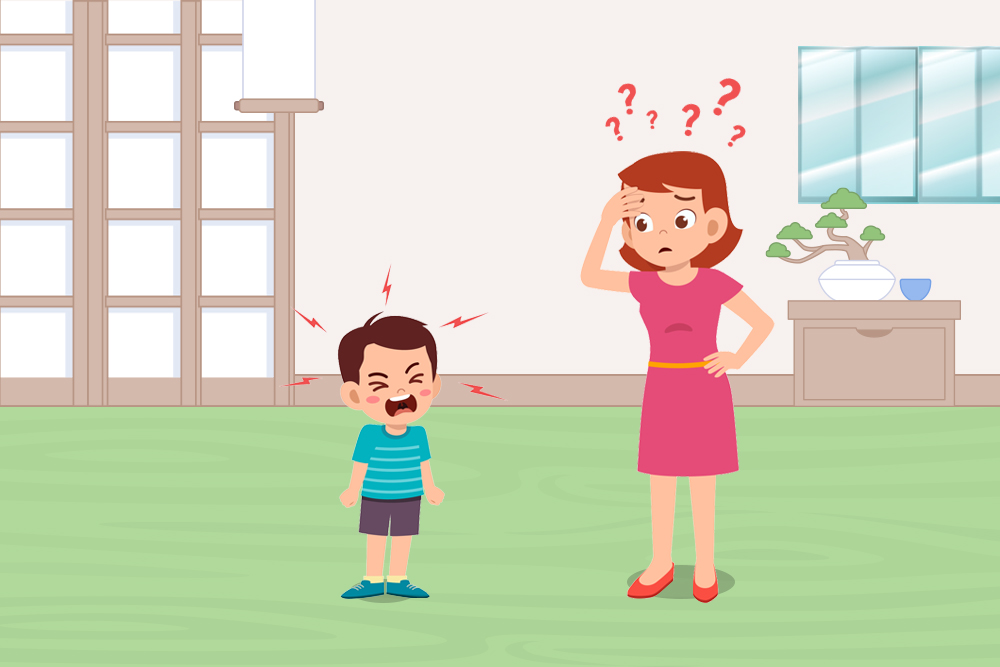How to Deal with Temper Tantrums
- admin
- 2022-05-24
- 3 min read

While in toddlers, temper tantrums are considered a part of growing up, in many cases, we even find pre-schoolers displaying such behaviour. You may find the child screaming, kicking, falling down, running away, yelling, crying uncontrollably, etc. Some might even break or throw things, hold their breath, and even vomit as part of a tantrum. While toddlers (age 1-3) display such behaviour because they cannot express their emotions, in older kids the tantrums surface because they haven’t understood a constructive and safe way to manage or express such feelings like helplessness, anger, tiredness, irritation, frustration, etc. Here are some ways to deal with temper tantrum:
Do not give in to demands
It is vital to NOT give in to your child’s demands, just because the tantrum is putting you in an awkward situation. Otherwise, soon the tantrums will become more of a psychological play where the child would deliberately throw a tantrum in public so that you agree to his/her demands, just to save face. By not giving in to your child’s demands under such circumstances, you will be sending a clear signal that tantrums will not help them get what they want. Also, do not try to bribe your child to find a quick fix for the tantrum.
Paradoxical instruction
This may work wonders with some kids. Simply give them the permission to yell and scream as much as they want or until they’re ready to stop. You could say, It’s OK if you shout loudly. Scream as much as you want, I won’t stop you. Once the child realises that you are unaffected by their behaviour, he/she may not see any point in it. You can especially try this approach when you are in a big open space (like a park) since the noise will not bother anyone. However, if you are in an enclosed space with a lot of people around, simply carry your child somewhere else so that others do not feel disturbed.
Stay calm
Tantrums can be agitating for the parents and often make them feel helpless. Most of us lose our patience and end up either spanking the child, yelling at the kid, or simply dragging our child away. Displaying such behaviour does not really do any good and ends up leaving us exhausted instead. Try to stay quietly with your child during a tantrum and do not try to reason with him/her. You may hold them or gently touch them or give them their space based on the situation. Try to speak to them in a low voice and continue doing whatever you were doing before the tantrum.
Act once the tantrum subsides
The conversation that you have with your child once the tantrum has passed is crucial. Do embrace your child and ask them to identify the emotion they were feeling. This will help you understand the triggers for the tantrums and also make you more aware of the emotion that your child is struggling to express constructively. Tell them how they could have handled the situation without getting all worked up. It is important to comfort your child because a tantrum not only takes a toll on the parents but is physically and mentally taxing for the child as well.
No matter how much you try to avoid a tantrum from coming, your child may still surprise you by displaying such seemingly irrational behaviour when you least expect it. It is essential to be mentally strong while deal with temper. Remember that while you may not always be able to stop a tantrum from coming, you can try the above-mentioned ways to ensure that the experience is less stressful for everyone.
Authored by Bhavna Bhalla,
A full-time mother for the last six years and a part-time writer for over a decade with a passion for travelling and engaging in intellectually-stimulating conversations.
21K School
Read our latest education blogs here. We are pioneers in proffering personalised, affordable and high-quality lessons using an advanced learning platform.


Join Asia’s Leading Online School and Unlock
endless opportunities
Join Asia’s
Leading Online School
and Unlock endless opportunities

 Thailand
Thailand




